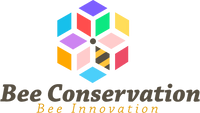Bees are our best-loved and most important commercially available pollinators. With over 20,000 species of bee worldwide and 270 in the UK, bees are vital to sustaining the global ecosystem as assistants to food production. Bees are responsible for the transfer of pollen between plants, which is vital to the survival and growth of the vast majority of plant species. As over 90% of the leading crop types are visited by bees, farmers rely on pollination to support our food system. Farmers also rely on a diversity of bees to pollinate their produce as certain types of bees are more effective at pollinating plants than others. This means it is crucial that we keep a healthy and diverse number of bee species in the UK to maintain a steady supply of food.
Bees are also crucial in maintaining the biodiversity of ecosystems. In Europe, bees pollinate over 80% of the wildflowers in the countryside and are therefore important in sustaining plant and animal life across the continent. As some bees have an affinity to particular plants, they require specific natural habitats to thrive, so the loss of these habitats to climate change is drastically affecting the bee population. Ecosystems are symbiotic, so changes to one type of plant or animal within the ecosystem has a ripple effect on the rest of the ecosystem. Without bees, millions of species of plants would remain unpollinated, which would lead to an accelerated rate of extinction in other species. Understanding the relationships of species within an ecosystem is crucial in recognising why we must protect bees and all life on earth in the face of climate change.
At Bee Conservation, we ensure that our hives are healthy and free from artificial products to keep our bees happy. We conduct pollen tests on our hives to test for environmental contamination including from pesticides, heavy metals, pollutants, chemicals, and fertilisers. Once we have these results, we advise our clients on what action is needed to improve the area. These tests offer a measure of hive health but also act as a bioindicator of the contamination levels in the surrounding area, which can inform businesses when shifting the environment of their workplace to better improve health for people and planet.
We can also offer state of the art biome analysis tests to identify fungi, yeasts, bacteria, and viruses to DNA level. These tests show what airborne presence there is of antibiotic resistant strains of diseases and show what can be done to reduce these risks. Biome testing is crucial in determining what makes a hive thrive or collapse but can also be used to improve the surrounding area of the hive.


